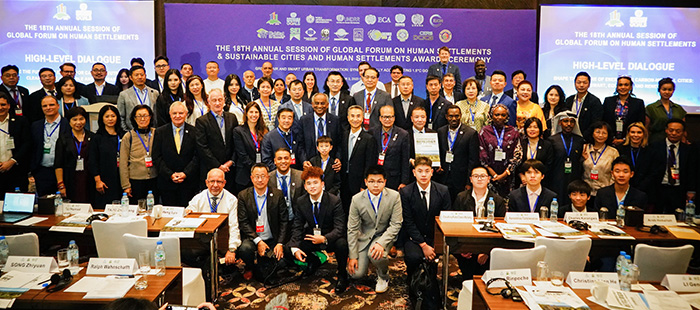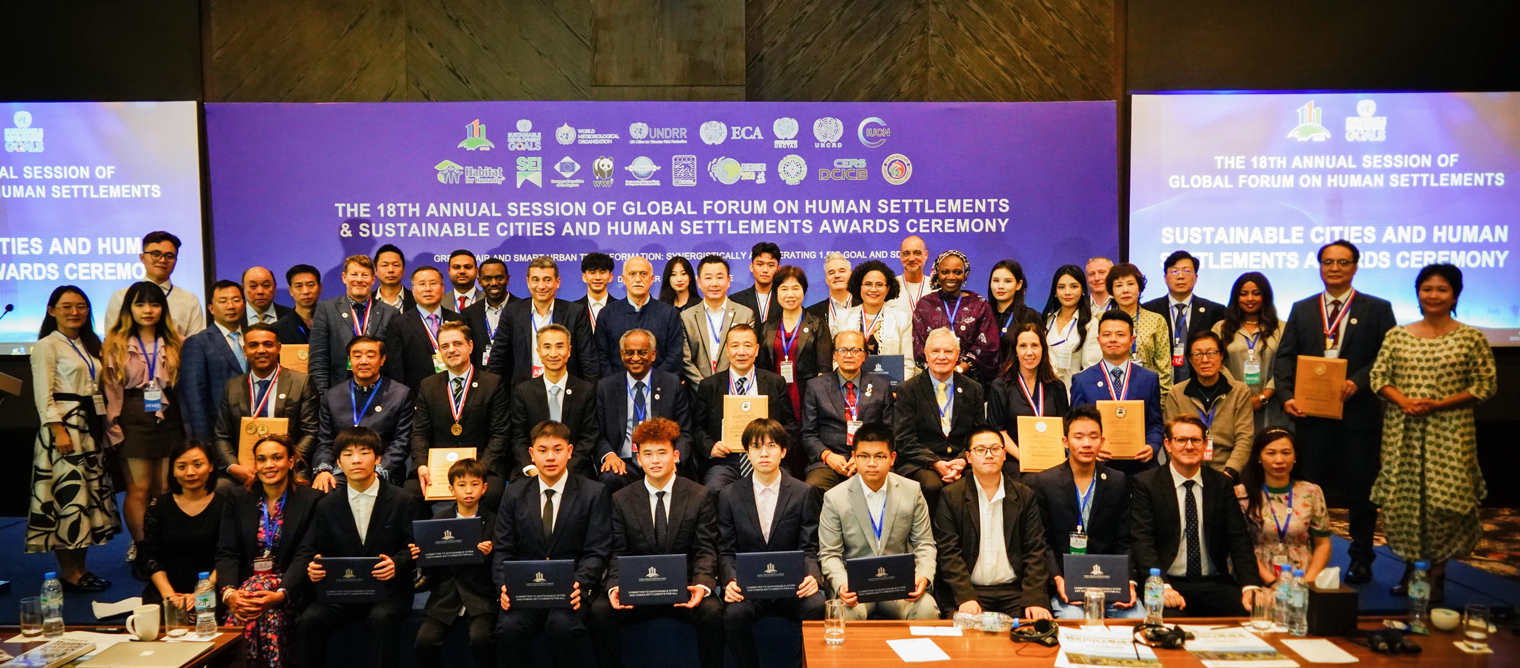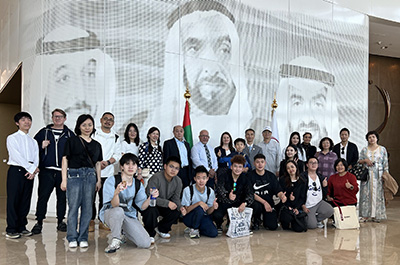


Committed to Sustainable Cities and Human Settlements for All

In Special Consultative Status with ECOSOC
(December 3, 2023) As an important part of COP28 and a follow-up action implementing the consensus of the Sustainable Development Goals Summit, the 18th Annual Session of Global Forum on Human Settlements (GFHS 2023) was successfully held in Dubai on December 2-3, 2023, with the theme being “Green, Fair and Smart Urban Transformation: Synergistically Accelerating 1.5°C Goal and SDGs”. The forum was addressed by honorable guests such as Ambassador Anwarul K. Chowdhury, Chairman of Global Forum on Human Settlements, former UN Under-Secretary-General and High Representative, Prof. Marina Silva, Minister of Environment and Climate Change, Brazil, Ms. Gauri Singh, Deputy Director-General, International Renewable Energy Agency, Ms. Lamia Kamal-Chaoui, Director, OECD Centre for Entrepreneurship, SMEs, Regions and Cities, Mr. Apostolos Tzitzikostas, Governor of Central Macedonia in Greece, Vice President, European Committee of the Regions (CoR), European Union, Mr. James Leather, Director of Transport, Asian Development Bank, and others. The forum brought together more than 300 professional participants representing 40+ countries.

Opening Session
The forum is hailed as one of the most important conferences worldwide focusing on sustainable cities and human settlements. Major partners showed continuous engagement with this year’s forum. 20 leading organizations joined GFHS 2023 as co-organizers and collaborators. Some of the main partners are World Meteorological Organization (WMO), United Nations Conference on Trade and Development (UNCTAD), United Nations Office for Disaster Risk Reduction (UNDRR), United Nations Economic Commission for Africa (UNECA), United Nations Centre for Regional Development (UNCRD), Organisation for Economic Co-operation and Development (OECD), International Union for Conservation of Nature (IUCN), World Wildlife Fund (WWF), European Committee of the Regions (CoR), European Union, Swedish Energy Agency (SEA), Stockholm Environment Institute (SEI), International Ocean Institute (IOI), Habitat For Humanity International (HFHI), C40 and Chinese General Chamber of Commerce UAE (CGCC).
More than 40 outstanding individuals contributed to the forum, including senior officials from relevant national governments, the United Nations and other international organizations, city mayors, business leaders, well-known experts and scholars, among others. The forum was covered by a number of mainstream media outlets around the world. Participants representing more than 40 countries had fruitful deliberations on 10 key issues, put forward scientific solutions and policy recommendations, reached a consensus on a set of outcomes and recommended a batch of outstanding sustainable development practices and innovations. The forum has made positive contribution to the implementation of the SDGs and the Paris Agreement.
Ms. Erica Allis, Chief of Partner Engagement and Coordination Division at World Meteorological Organization delivered the opening remarks on behalf of WMO Secretary General Prof. Petteri Taalas, and stressed that countries and cities need better understand and map their risks, deploy adequate observation and monitoring systems and boost their prediction and forecasting capacities to anticipate hazards, as well as leveraging ICTs, cell-broadcast and standards such as the common alerting protocol to disseminate warning information to all people at risk.
Ms. Gauri Singh, Deputy Director-General, International Renewable Energy Agency shared that city authorities can shape and accelerate the evolution of a renewable-based energy transition. They can be target setters, urban planners and regulators. They are often owners and operators of municipal buildings and public vehicle fleets. Cities can aggregate the energy demand, or function as financiers of renewable projects.

High-level Dialogue
Mr. Apostolos Tzitzikostas, Governor of Central Macedonia in Greece, Vice President, European Committee of the Regions (CoR) emphasized that it is now time to streamline the efforts at all level, starting from the global level, to promote a more forward-looking approach that really fosters implementation. This is not about power games: this is about ensuring a liveable planet for our children and grandchildren. Rules need to be consulted with the ones implementing them to ensure they can actually work. And the climate change area is one where we cannot allow to fail. We need all hands on deck and all brains around the table to drive this complex transition. As local leaders we can lead the process.
In his keynote statement, Mr. James Leather, Director of Transport, Asian Development Bank indicated that sustainable low-carbon solutions are uniquely suited to secure economic and social development if we make the right choices. We should not oversimplify the discussion by just talking about electric vehicles replacing gasoline or diesel-powered vehicles. While such a change addresses climate change it does not increase access, reduce congestion, or improve public transport services; nor does it make transport safer.
Mr. Zhengang Tang, Chairman of Chinese General Chamber of Commerce UAE introduced in the keynote speech the achievements in green transformation, smart cities, clean energy, and infrastructure construction in UAE, and presented Dubai Green Mobility Strategy 2030 and Paperless Strategy. He indicated that green transition is the core of urban transformation, and it is crucial to enhance the sustainability and environmental conservation in cities by promoting green technologies and innovative models.
GFHS co-founder and Secretary General Mr. Lu Haifeng pointed out in his closing remarks that the focus of urban transformation lies in buildings and communities. Greener, healthier, low-carbon, efficient, smart and convenient buildings and communities are the foundation for improving the quality of life and well-being of people. People-oriented public space as well as safe and accessible green mobility make cities more attractive and dynamic. These are the key topics addressed at the forum and are also the key for synergistically accelerating the 1.5°C Goal and SDGs.

VIP Speakers and Students
Other important speakers at GFHS 2023 include Mr. Adalberto Filho, National Secretary for Urban Environment and Environmental Quality, Ministry of Environment and Climate Change, Brazil, Mr. Erion Veliaj, Mayor of Tirana, Albania, Ms. Alison Gilliland, Dublin City Councillor, former Lord Mayor of Dublin, Ireland, Mr. Choudhury Rudra Charan Mohanty, Environment Programme Coordinator, United Nations Centre for Regional Development (UNCRD)-DSDG/UN DESA, Mr. Ahmed Baghoum, Chief Executive Officer of Masdar City, UAE, Mr. Charles Karangwa, Head of the Nature-based Solutions Management Hub, International Union for Conservation of Nature (IUCN), Mr. Zhengang Tang, Chairman of Chinese General Chamber of Commerce UAE, Ms. Amira Nasser Mostafa, Deputy Director of the Chairman Technical Office, Egyptian Meteorological Authority, Ministry of Civil Aviation, Egypt, Dr. Fernanda Carvalho, Global Policy Lead, Climate & Energy Practice, WWF, Dr. Puja Sawhney, Global Director, Climate Change, Habitat for Humanity, Prof. Yousef Nazzal, Chair, Dept. of Life & Environmental Sciences, College of Natural & Health Sciences, Zayed University, UAE and Ms. Urda Eichhorst, Project Director at GIZ, among many others.
On an urban planet, the global population has reached 8 billion, with 4.5 billion living in urban areas. Cities are on the front line of combating climate change, conserving biodiversity and achieving sustainable development goals. In this context, the forum called for urgent actions to accelerate a just, smart and sustainable urban transition. We must continue to improve the way we plan, invest, build, and manage cities, and move towards the city we need through developing innovative governance structures and effectively planning and managing urban space. We need to make the most of the digital revolution and the power of science and technology, shape a future energy system that is clean, smart, equitable and renewable, provide an early warning system for all and make communities and cities future-proof, greener, smarter and more resilient.
More importantly, we need to synergistically accelerate decarbonization and decoupling in cities, promote compact urban forms and nature-positive solutions, provide people-oriented and pedestrian-friendly public spaces, promote green lifestyles, develop zero-carbon and zero-waste buildings, communities, industrial parks and cities, thus promoting the harmonious coexistence between man and nature, strengthening social inclusion and solidarity, and enhancing general prosperity and well-being. The forum affirms that transformative action by cities need to be scaled from the local to the global, in order to make a significant contribution to the delivery of the SDGs and the 1.5°C climate goal.
The forum was grandly concluded with Sustainable Cities and Human Settlements Awards Ceremony 2023 (SCAHSA 2023) which recognized outstanding practices and innovations in promoting sustainable cities and human settlements, and recommended innovative concept, green technology and success experience. The awards commit to promote forces for change towards sustainable development on a wider scale.

VIPs and Awardees
This year, a total of 17 well-known organizations and individuals from around the world were honored with the award, including the world-renowned cultural city - Dublin, the capital of Ireland; Prof. Marina Silva, the world-famous defender of the Amazon rainforest and Minister of Environment and Climate Change, Brazil; Dubai Countryside and Rural Areas Development Framework Plan; Kunlun Mountain Grand Canyon Scenic Area and Layisu longevity village in Kunyu City, Xinjiang; Sichuan Kedao Agriculture Co., Ltd.; Restoration of Woodend Sanctuary by Nature Forward, United States; Bamboo Sports Hall at Panyaden International School in Chiangmai, Thailand; Aggregated Rain Grid Outcome Networks, Canada; and the experimental circular live-work housing block in Amsterdam, the Netherlands, among others. (The complete list of awardees can be accessed here: http://www.gfhsforum.org/award).
At the same time, the Youth Workshop on Climate Change and My City’s Transformation was held as an important part of the forum. Standout students were invited and delivered wonderful speeches at the forum and were awarded the honor of Global Youth Green Ambassador. It aims to encourage the youth to actively involve in environmental protection and sustainable development, mobilize the younger generation to embrace the sustainable development goals and scale up actions on the ground, thereby empowering them to become global citizens and future leaders.
The organizers also led a delegation to attend COP28-related activities. In addition, various supporting activities were organized, including a closed-door consultation to promote in-depth exchange and practical cooperation, and a visit to Masdar City and Zayed University.

Delegates attend COP28

Present The Collection of Global Forum on Human Settlements to Mr. Ahmed Baghoum,
Chief Executive Officer (CEO),Masdar City, UAE


Study Tour to Masdar City Delegates Visit Zayed University
(By the Department of Public Information, GFHS)
Copyright © Global Forum on Human Settlements (GFHS)
